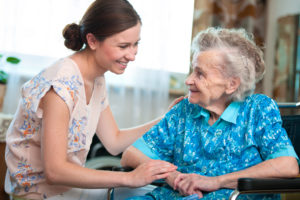Practicing Self Care as a Caregiver
 According to AARP, the approximately 42 million Americans who care for a family member or friend over the age of 50 contribute $600 billion worth of free labor to the economy. However, that care is not free to them. In fact, many individuals spend about a quarter of their annual income toward caregiving costs. Being a caregiver isn’t just an economic sacrifice – it’s also an emotional and often turbulent strain for the person. Because so many caregivers function quietly, expecting nothing in return, they exist quietly with few or limited resources.
According to AARP, the approximately 42 million Americans who care for a family member or friend over the age of 50 contribute $600 billion worth of free labor to the economy. However, that care is not free to them. In fact, many individuals spend about a quarter of their annual income toward caregiving costs. Being a caregiver isn’t just an economic sacrifice – it’s also an emotional and often turbulent strain for the person. Because so many caregivers function quietly, expecting nothing in return, they exist quietly with few or limited resources.
Here are a few tips, ideas, and suggestions for easing the emotional and mental strain of being a caregiver to a friend or loved one:
Tips for Coping
Set routines:
To give structure and a natural flow to each day, try doing the same basic activities around the same time each day. Routine reduces the need for small or last-minute decisions each day that can add stress.
Use a planner or calendar:
Take advantage of a planner or calendar to document the older adult’s appointments and important tasks. This reduces the possibility of last-minute surprises since you will be able to plan ahead.
Keep a journal:
A journal can be a key caregiving tool by helping you feel more in control. Writing quick notes in a dedicated journal means you will have accurate information about what happens and when it happens. And it makes it easier to share that information with doctors, family members, and other caregivers when you need to.
Find time to relax:
If you don’t care for yourself, your own physical and mental health will decline – thus jeopardizing your ability to provide care for your loved one. Consider asking someone you trust to fill in for you so you can find time to relax and do things you enjoy. Even having short breaks can make a significant difference in your day.
Have freezer meals on hand:
Cook ahead of time and freeze meals in advance. This removes the stress of cooking on extremely stressful days and ready-to-eat meals are often healthier than fast-food options that may not be very nutritious. Ask family and friends to prepare pre-made meals as well, like casseroles – these can save time for you on a busy day when there is no time to cook.
Build in extra time:
Prioritize the things you can do each day realistically and plan extra time for those tasks. This way, if something takes longer than it should, you’ve already built in the extra 10-15 minutes needed. And if those tasks don’t take that long at all, you have extra time.
Seek help from others:
Seek out support from people in your neighborhood, church, workplace, or elsewhere who are caregivers as well and can relate to your experience. You could also consider forming an informal support group that meets in-person, virtually or even shares tips and ideas through group chats and texts. There are also services that provide respite care for exhausted caregivers.
Resources, Gadgets, and Tools
Technology is moving fast and catching up to the needs of caregivers. In just the last few years, digital apps and devices have transformed how we care for loved ones:
- Look into GPS tracking devices to monitor a loved one and know where they are in real time.
- Home cameras linked to your phone enable you to remotely check in on the whereabouts of your loved one, whether they are eating in the kitchen or watching TV in the living room.
- Health tracking tools are flourishing on the internet and on digital apps. These can help track blood pressure, blood sugar, weight, nutrition, and some can automatically send data to your loved one’s physician.
- While using live video chats like Zoom to help your loved one remain connected to friends and family, remember to also use this time to see how they might be able to help you as well.
- Use erasable whiteboards and calendars located throughout the home for reminders, instructions, and directions, especially for loved ones living with dementia.
- If the home is equipped with one of Amazon’s Alexa voice-controlled devices (like Echo), verbal alarms and reminders can be set up, and offer shopping options for those with mobility issues and assistance making phone calls. News and music are also readily available.
Being a caregiver can be very challenging. So it’s important for caregivers to find ways to take care of their own needs, otherwise caring for an elder may become a struggle, or worse, impossible if your own health suffers. Caregivers can’t provide adequate care if they’re running on empty and should prioritize their own wellness to avoid anxiety, frustration, and burnout.





